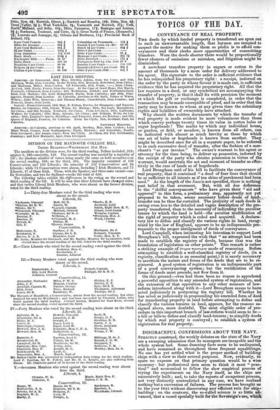TOPICS OF THE DAY.
CONVEYANCE OF REAL PROPERTY.
Tax deeds by which landed property is transferred are spun out to such an unwarrantable length, that laymen are tempted to suspect the motive for making them so prolix is to afford con- veyancers and their clerks more opportunities of committing blunders. Were the deeds shorter there would be proportionally fewer chances of omissions or mistakes, and litigation might be diminished.
A merchant transfers property in sugars or cotton to the amount of thousands by a mere order for delivery addressed to his agent. His signature to the order is sufficient evidence that he has relinquished his proprietary right : a receipt, indorsed on i the order by the party n whose favour it is made out, is sufficient evidence that he has acquired the proprietary right. All that the law requires in a deed, or any symbolical act accompanying the transfer of property, is that it shall fix with precision the moment at which the gift or exchange is completed, in order that the transaction may be made susceptible of proof, and in order that the party may be known to whom at any given time the subsidiary rights and liabilities of ownership have attached. Why should the written documents by which the transfer of real property is made evident be more voluminous than those which convey perhaps twenty times its value in cotton bales or sugar hogsheads ? The marks by which any individual house, or garden, or field, or meadow, is known from all others, can be indicated with almost as much brevity as those by which one set of bales or hogsheads is known from another. They. might be described once for all in a separate paper, to be referred to in each successive deed of transfer, after the fashion of a mer-
chant's "as per invoice." The owner's warrant to his agent or attorney for the time being, to deliver up possession, indorsed by the receipt of the party who obtains possession in virtue of the warrant, would ascertain the act and moment of transfer as effec-. tively in the case of lands as of hogsheads. Lord Brougham said of his bill to facilitate the conveyance of real property, that it contained "a deed of four lines that should be as sufficient to all intents as if ten skins of parchment had been used." As the length of the lines is not specified, there is nothing past belief in that averment. But, with all due deference to the "skilful conveyancers" who have given their "aid and approval" to this form, a preliminary step, apparently not yet proposed to be taken, seems necessary before deeds of land- transfer can be thus far curtailed. The prolixity of such deeds is owing even less to the detailed and vague description of the pro- perty transferred, than to the necessity of indicating the peculiar tenure by which the land is held—the peculiar modification of the right of property which is ceded and acquired. A declara- tory law to define and classify- the various rights in land, recog- nized by the law of England, appears to be an indispensable pre- requisite to the proper abridgment of deeds of conveyance. Lord Campbell, when intimating his intention to support Lord Brougham's bill, expressed the wish that "an attempt had been made to establish the registry of deeds, because that was the foundation of legislation on other points." This remark is rather a striking example of brepor irpo-rspom mode of reasoning. Before attempting to establish a well-classified registry of deeds, (in a registry, classification is an essential point,) it is surely necessary to ascertain the nature and forms of the deeds that are to be re- gistered. A good system of registration is an indispensable part of a good conveyancing system but the rectification of the forms of deeds must precede, not flow from it. On this ground—even had there been no reason to apprehend a powerful opposition to any amended system of registration, and the extension of that opposition to any other measure of law- reform introduced along with it—Lord Brougham seems to have acted judiciously in postponing his registry bill. Whether he has acted as judiciously in propounding his amended form of deed for transferring. property in land before attempting to define and classify the various tenures in land, appears, for the reasons as- signed above, more doubtful. The most eligible order of pro- cechire in this important branch of law-reform would seem to be— a bill or bills to define and classify land-tenures ; to simplify deeds by which real property is conveyed ; to establish a system of registration for real property.


























 Previous page
Previous page